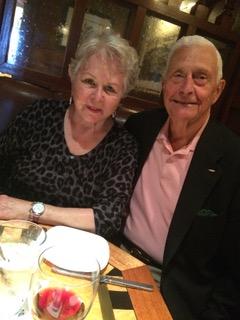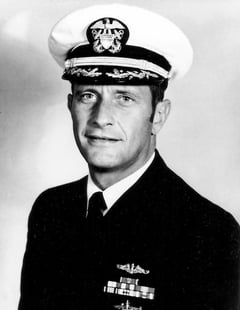 How An Uncommon Love and Heartfelt Care Combined to Support Alzheimer’s Research"
class="bg-img"
fetchpriority="high"
loading="eager"
decoding="async">
How An Uncommon Love and Heartfelt Care Combined to Support Alzheimer’s Research"
class="bg-img"
fetchpriority="high"
loading="eager"
decoding="async">

On the evening of September 20, 2022, Mary Flynn watched as the ribbon was cut on a new infusion suite at the Memory and Aging Program at Butler Hospital, a globally recognized center for Alzheimer’s research. The new facility was made possible, in part, thanks to her donation. She made this donation even though her husband, Jay, never had the chance to participate in research before losing his own life to the disease. It was an uncommon act of generosity, made in memory of an uncommon love.
“I was a nurse for five years before I was recruited in 1969 to join the Navy,” recalls Commander Mary Taylor Flynn, Nurse Corps, USN (ret). “My first duty assignment was in Portsmouth, VA, and then I went to Japan. That’s where I met Jay.”
Commander John J. Flynn was born and raised in Newport, RI. He joined the Navy in 1956 and by the time he met Mary in Japan, he had already served as Executive officer of the USS Denver and was Commanding Officer of the amphibious ship USS Mobile. 
In April 1975, Cmdr. Flynn captained the Mobile as part of “Operation Frequent Wind,” the evacuation of Saigon, Vietnam. A New York Times journalist, who evacuated to the Mobile with 32 other journalists, said of the captain, “Cmdr. J. Flynn of Newport, RI had a lean jaw, steel blue eyes and a quiet confidence and the Mobile was well prepared to do its unlikely job of picking up Vietnamese refugees.”
Mary’s memory of Jay at that time is no less impressive.
“Jay was in submarines. He served in three submarines and was a ‘great navigator of the western world’, he said. When I met him, he was the commanding officer of this big amphibious ship. He cut quite a swath.”
During his career Cmdr. Flynn was awarded:
• The Bronze Star with combat “V”
• The Combat action and Navy Unit Commendation ribbons
• Other service and campaign medals.
His final tour of duty was at the Pentagon. He retired from the Navy in 1976 and began his civilian career doing Naval analysis for several private companies.
“We had a different kind of romance,” Mary says. “We traveled a lot, and so we were just two Navy folks bumping around, having fun. It was about 10 years before we got married. When I left Japan, I was stationed in San Diego at first, and then Jay was able to get me moved to D.C. where he was, and I had a gig at the White House. Then we got married and served together in Italy for three years. That was like a big honeymoon, we loved it there.”
Eventually, the couple retired together, spending their summers in Newport and winters in Coronado, CA. It was “the best set up,” in Jay’s words. But, then he began noticing strange symptoms.
“He noticed it first,” Mary recalls. “Here’s a guy who would do the New York Times crossword puzzles in ink, and he wasn’t able to do them anymore. It was very hard for him. He covered up so much. He would want to have a conversation with someone but then would look at me for the words. I would write notes for him if we were going to a party or something – who was going to be there, what their wives’ and kids’ names were. And that got hard for me, too. I was always on high alert for that kind of thing. You’re always walking on eggshells, and it’s exhausting.”
In time, both Mary and Jay came to accept the inevitable.
“As it wore on, I knew what the score was. I knew we weren’t going to get out of it. And that made accepting it easier, and gave us the ability to plan,” she says.
Jay began seeing a neurologist at the University of California San Diego who, Mary would later learn, had studied under Memory and Aging Program founder Dr. Stephen Salloway. As Jay’s condition worsened, the couple decided to stay in Rhode Island year-round, where they had more support. That’s when Jay began seeing Dr. Salloway.
“It was determined that Jay was too far gone to benefit from any of the program’s studies at that time, so we just soldiered on and continued seeing Dr. Salloway for his follow-ups. But Dr. Salloway is such a charming, sweet man and he paid good attention to me and to my husband. He’s just kind and smart. He has a lovely personality and is an attentive listener.”
Jay passed away on January 5, 2019, after an incredible life of 83 years - 40 of them shared with Mary. It was, of course, a difficult time for Mary, but she leaned on the strength of family and friends.
“Jay’s brother had five daughters and they were all crazy about him. All but one live here in Newport and they’re all so supportive of me, and they were grand to [Jay] when he was failing. I couldn’t have done it without them. They are just superior women. Family is everything in this grim disease.”
Now, three years later, Mary is paying forward the care and support she and Jay received at the Memory and Aging Program - through her donation, along with a generous helping of something more for the future: hope.
The new infusion suite offers study participants a bright, spacious, and state-of-the-art facility, designed with their care and comfort in mind. It also promotes the advancement of crucial research of investigational medications that could one day radically change what it means to have Alzheimer’s – or to prevent it from occurring altogether.
“Really, it was Dr. Salloway that inspired me to do this,” Mary says. “He always made us feel very special during what was such a tough time. I don’t throw a lot of money after things that I don’t think would have a good outcome. But I knew he was doing good work, and this was a physical, tangible resource that would help to advance his research.”
“There are a lot of exciting things happening in Alzheimer’s research right now,” she continues. “It’s hard to say what the outcome will be, but thank God there are people like Dr. Salloway who are working to keep the research moving forward.”
Join the Effort to End Alzheimer’s
Now, you can join the fight against Alzheimer’s Disease and dementia. If you are between the ages of 45 – 85 with normal memory or mild memory loss, you’re encouraged to join the Butler Hospital Alzheimer’s Prevention Registry. We will contact you if a study is a good fit.
Click HERE to learn more or to register.
Disclaimer: The content in this blog is for informational and educational purposes only and should not serve as medical advice, consultation, or diagnosis. If you have a medical concern, please consult your healthcare provider or seek immediate medical treatment.
Copyright © 2026 Care New England Health System